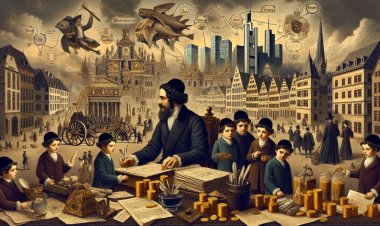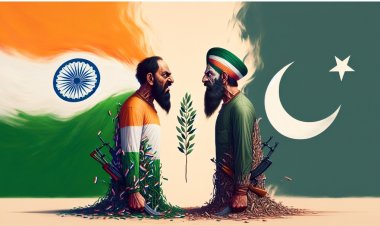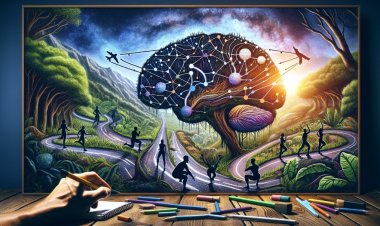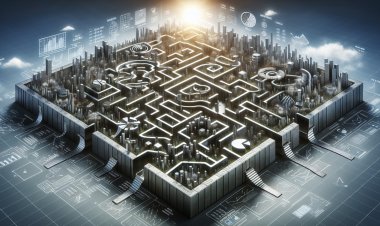Narendra Modi: The Rise and Impact of India's Influential Leader
"Trace the remarkable journey of Narendra Modi, from his early beginnings to becoming one of India's most influential leaders. This article delves into Modi's rise to power, his political strategies, and the significant impact he has had on India's development and position on the global stage."
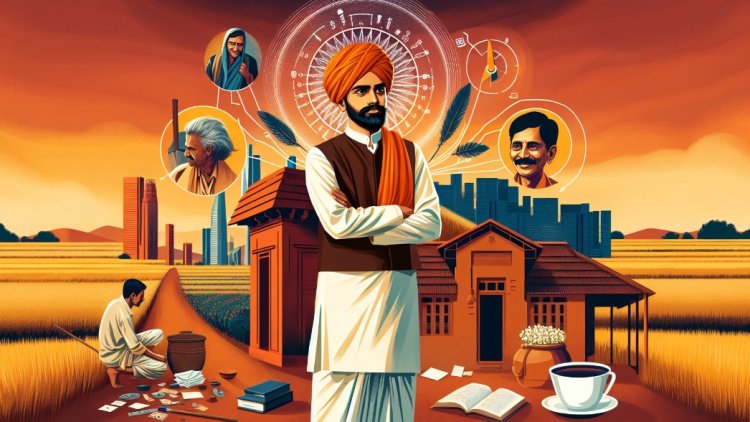
Introduction
The conflict between the Indian Armed Forces and China has become a significant issue in recent times. The disputed border region of the Galwan River Valley has been a frequent hotspot for clashes between the two nuclear-armed nations. What makes this conflict particularly significant is the fact that both India and China are home to a quarter of the world's population. The delicate relationship between these two nations has the potential to shape the 21st century. The conflict has escalated to hand-to-hand combat, highlighting the high stakes involved. The fallout from a full-blown conflict between India and China would have catastrophic global consequences. Understanding the dynamics and potential impact of this conflict is crucial to comprehending the current state of global affairs.
-
Overview of the Indian Armed Forces Conflict with China
-
Importance of the India-China relationship
-
The potential global impact of the conflict
Narendra Modi's Background and Early Life
Narendra Modi, India's influential leader, was born into humble beginnings in Gujarat, just after India gained independence from British colonialism. His father sold tea, and his family lived in a home without windows. However, Modi's upbringing did not hinder his ambition and drive to succeed.
At around 8 years old, Modi developed a keen interest in a local organisation called the RSS (Rashtriya Swayamsevak Sangh). The RSS is an organisation founded on the principles of an Indian nationalist ideology called Hinduism. According to Hinduism, to be truly Indian, one must be Hindu. Despite the RSS's infamous reputation across India, with one of its members assassinating Mahatma Gandhi, Modi joined the organisation.
Modi's involvement in the RSS was fundamental to shaping his beliefs and ideologies. Laxman Inamdar, who recognised his enthusiasm for Hindu culture and energy, served as his mentor. Under Inamdar's guidance, Modi pursued politics and joined the RSS's political party, the Bharatiya Janata Party (BJP).
During this time, India was grappling with religious tensions, particularly between Hindus and Muslims. The country had experienced violent clashes and the fallout from the partition between India and Pakistan. Modi witnessed these tensions firsthand, which further solidified his commitment to Hinduism and the RSS's ideologies.
In 2001, Modi became the Chief Minister of Gujarat, a position he held for over 12 years. During his tenure, he focused on economic reforms, attracting investment, and improving infrastructure. Gujarat's economy experienced significant growth under his leadership, with an annual growth rate of 10%.
Modi's rise to power in Gujarat and his success as Chief Minister paved the way for his entry into national politics. In 2014, he was elected as the 14th Prime Minister of India, marking a major shift in the country's leadership and direction.
The Political Journey of Narendra Modi
Narendra Modi, India's influential leader, began his political journey through his early involvement with the Rashtriya Swayamsevak Sangh (RSS) and the Bharatiya Janata Party (BJP). At the age of around 8, Modi developed an interest in the RSS, an organisation founded on the principles of Hinduism, an Indian nationalist ideology that emphasises Hindu identity. Despite the RSS's controversial reputation, Modi joined the organisation and was mentored by Laxman Inamdar, who recognised his energy and passion for Hinduism. Under Inamdar's guidance, Modi pursued a career in politics and joined the BJP, the political wing of the RSS.
Modi's entry into politics coincided with a crucial period in India's history. The country was grappling with religious tensions, particularly between Hindus and Muslims, as a result of the aftermath of the partition between India and Pakistan. Modi witnessed these tensions firsthand, which reinforced his commitment to Hinduism and the ideologies of the RSS.
During the Emergency period in the 1970s, when Prime Minister Indira Gandhi declared a state of emergency, Modi emerged as a prominent activist. Despite being a member of the banned RSS, Modi gained recognition for his actions and became known for his energy and determination.
Modi's political career truly took off when he was appointed Chief Minister of Gujarat in 2001. During his tenure, he focused on economic reforms, attracting investment, and improving infrastructure, leading to significant economic growth in Gujarat.
In 2014, Modi was elected as the 14th Prime Minister of India, marking a major shift in the country's leadership and direction. Since then, he has continued to implement his vision for India, combining pro-business economic policies with a Hindu nationalist agenda.
Impact of Modi's Leadership in Gujarat
Narendra Modi's tenure as Chief Minister of Gujarat had a significant impact on the state's development and set the stage for his national leadership. During his time in office, Modi implemented economic reforms and focused on improving infrastructure, which led to significant growth in Gujarat's economy.
Modi's economic reforms aimed to attract investment and create a business-friendly environment in Gujarat. His policies included reducing corruption, streamlining government processes, and promoting entrepreneurship. These reforms helped Gujarat achieve an annual growth rate of 10% under Modi's leadership.
One of the key aspects of Modi's governance in Gujarat was the implementation of the "Gujarat model." This model emphasised economic development, job creation, and inclusive growth. It aimed to showcase Gujarat as a model state and attract investment from both domestic and international sources. The success of the Gujarat model was evident in the state's economic growth and development during Modi's tenure.
However, Modi's leadership in Gujarat was not without controversy and criticism. Some critics argue that Modi's economic policies favoured big businesses over small-scale industries and marginalised certain sections of society. There were also controversies surrounding his handling of religious tensions and the Gujarat riots in 2002.
Despite these controversies, it is undeniable that Narendra Modi's leadership had a lasting impact on Gujarat's development. His focus on economic reforms and infrastructure improvements contributed to Gujarat's growth and positioned the state as a model for other regions in India. The Gujarat model became a topic of discussion and debate in national politics, shaping Modi's image and paving the way for his rise to power as the Prime Minister of India.
Modi's Rise to Power as Prime Minister
Narendra Modi's charismatic campaign, important policies, and contentious choices marked his path to becoming India's Prime Minister. In 2014, Modi campaigned as the Bharatiya Janata Party's (BJP) candidate for prime minister, promising to bring dynamic economic growth and national security to India. His campaign focused on his success as the Chief Minister of Gujarat, where he implemented economic reforms, attracted investment, and improved infrastructure.
After winning the 2014 elections, Modi began his first term as Prime Minister. His key policies included the implementation of demonetization, which aimed to combat corruption and black money but caused economic disruption. He also introduced the Goods and Services Tax (GST) to simplify the tax code and attract foreign investment. These policies, while controversial, demonstrated Modi's commitment to economic reform and development.
Controversy followed Modi, particularly surrounding his handling of the 2002 Gujarat riots. Critics accused him of not doing enough to prevent the violence and even condoning it. However, legal proceedings concluded that he had no case to answer. Despite these controversies, Modi's popularity remained strong, and he was reelected as Prime Minister in 2019.
During his second term, Modi focused on majoritarian policies and nationalism. He repealed the special autonomous status of Jammu and Kashmir, leading to tensions with Pakistan. He also implemented the Citizenship Amendment Act, which accelerated citizenship for persecuted religious minorities from neighbouring countries but excluded Muslims. These decisions sparked protests and religious violence in India.
Internationally, Modi sought to strengthen India's position on the global stage. He cultivated relationships with key nations like the United States, Australia, and Japan through initiatives like the Quad. His economic reforms and efforts to position India as a manufacturing hub attracted foreign investment and diversified supply chains away from China.
Modi's rise to power as Prime Minister marked a significant shift in India's leadership and direction. His energetic campaign, focus on economic development, and controversial decisions have shaped his tenure as one of India's most influential leaders. As the 21st century unfolds, Modi's impact on India and the world is likely to continue.
Foreign Policy and India's Global Position
Under Narendra Modi's leadership, India's foreign policy has undergone significant changes, focusing on alliances and addressing tensions with neighbouring countries. Modi has adopted a pragmatic approach to foreign policy, aiming to protect India's strategic interests and promote economic growth.
-
Modi's approach to foreign policy and alliances: Modi has emphasised the importance of building strong alliances and partnerships with other countries. His government has actively engaged with major powers, such as the United States, Australia, and Japan. The Quad Alliance, comprising India, the US, Australia, and Japan, is an example of India's efforts to counterbalance China's influence in the Indo-Pacific region.
-
Tensions with China and Pakistan: The border tensions between India and China in the Galwan River Valley have heightened concerns about regional stability. Modi's government has taken a firm stance against Chinese aggression and has strengthened India's defense capabilities. Similarly, tensions with Pakistan over issues such as terrorism and the disputed region of Jammu and Kashmir have been a recurring challenge for India's foreign policy. Modi has pursued a robust approach to safeguard India's national security.
-
India's role in the Quad alliance: India's participation in the Quad alliance demonstrates its growing role as a major player in the Indo-Pacific region. The Quad aims to promote a free and open Indo-Pacific, focusing on issues such as maritime security, counterterrorism, and economic cooperation. By aligning with countries that share similar concerns about China's assertiveness, India aims to protect its interests and maintain regional stability.
Modi's energetic and proactive foreign policy approach reflects India's desire to assert itself on the global stage. India's strategic alliances and efforts to address tensions with neighbouring countries are aimed at securing its national interests and promoting regional stability.
Modi's Impact on India and the World
Since becoming the Prime Minister of India in 2014, Narendra Modi has had a significant impact on both his country and the world at large. Here are some key aspects of his leadership and the transformations that have taken place:
The Transformation of India under Modi's Leadership
Under Modi's leadership, India has undergone significant changes and developments. His focus on economic reforms, attracting investment, and improving infrastructure has fueled the country's growth. Gujarat, the state where Modi served as Chief Minister, experienced an annual growth rate of 10% during his tenure. This economic success paved the way for his rise to power as the Prime Minister of India.
Economic growth and technological advancements
Modi's pro-business economic policies and efforts to attract foreign investment have contributed to India's economic growth. His initiatives like "Make in India" and the Goods and Services Tax (GST) have aimed to simplify the tax system and promote manufacturing in the country. India has seen a rise in infrastructure development, digitalization, and advancements in areas like artificial intelligence and digital payments.
Controversies Surrounding Religious Freedom and Civil Liberties
Modi's leadership has also been marked by controversies surrounding religious freedom and civil liberties. Critics argue that his policies, such as the Citizenship Amendment Act, have marginalised certain religious groups, particularly Muslims. There have been instances of religious violence, protests, and concerns about press freedom during his tenure. These controversies have sparked debates about the balance between religious nationalism and secularism in India.
Despite the controversies, it is undeniable that Narendra Modi's leadership has brought about significant transformations in India's economy, infrastructure, and global positioning. His energetic approach to governance, focus on economic growth, and efforts to strengthen India's alliances have positioned the country as a major player on the world stage.
Conclusion
Narendra Modi's leadership has had a lasting impact on India and global politics. His rise to power as the Prime Minister of India marked a major shift in the country's leadership and direction. Under Modi's leadership, India has experienced significant economic growth, infrastructure development, and advancements in technology. However, there have also been controversies under Modi's leadership, particularly concerning civil liberties and religious freedom. His majoritarian policies and nationalist agenda have sparked protests and tensions within the country. Despite the challenges and criticisms, Modi's energetic approach to governance and focus on economic development have positioned India as a major player on the world stage. As the future unfolds, Modi's impact on India and the world is likely to continue.



 admin
admin 






